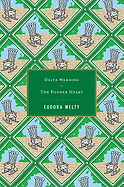 Staff Review by Chris Saliba
Staff Review by Chris Saliba The Golden Apples is both a strange and highly original work of fiction.
Eurdora Welty (1909-2001) wrote short stories, novels and essays. She was born in Jackson, Mississippi. She would live there for the rest of her life. During the Depression she worked as a publicity agent for the Works Progress Administration which was part of President Roosevelt’s New Deal program. In this job she conducted interviews, collected stories and took photographs of the people of Mississippi. In addition to her literary work, she published books of her Mississippi photography.
It was her experiences working around the state of Mississippi during the depression that inspired her first stories. Her first collection, A Curtain of Green, was published in 1941. The following year Welty published her debut novel, The Robber Bridegroom.
The wonderfully titled The Golden Apples was first published in 1949. It’s a collection of seven interrelated stories, with many of the characters appearing in different stories at different times of life. Its format and organisation are highly original, as the book is really suspended somewhere between being a novel and a story collection. Eudora Welty was inspired by Virginia Woolf at the time, and she does bring Woolf’s shimmering, impressionistic style to The Golden Apples.
The book is set in the fictional town of Morgana, and concentrates on a set of families and their internal dynamics. The stories also examine the relationships between the family groups. There are several outsiders to these Morgana families, and there are stories that concentrate on them and their relationships to the townsfolk. Welty likes to focus on otherness and has her characters daydream about slipping into different personalities. For example, when Nina in “Moonlake” muses on what it would be like to transform herself into someone else:
"The Orphan! she thought exultantly. The other way to live. There were secret ways. She thought. Time's really short. I've been only thinking like the others. It's only interesting, only worthy, to try for the fiercest secrets. To slip into them all – to change. To change for a moment into Gertrude, into Mrs Gruenwald, into Twosie – into a boy. To have been an orphan."
The main subject matter of the book, if there is one, is the cultural and family life of the Morgana residents. Welty beautifully weaves together the manners, natural environment and idiosyncratic personalities of the town. Her writing is wonderfully rich and strange, full of atmosphere and organic texture. You feel like you can smell, feel and touch Eudora Welty’s world.
There’s also quite a bit of sly humour in Welty’s writing. When a prim mother thinks a lifesaver has acted with impropriety, she says "You little rascal, I bet you run down and pollute the spring, don't you?"
The Golden Apples is perhaps the strangest and most unique work of fiction I’ve ever read. Welty’s stories are rich prose-poems. These are rare, exotic and frequently intoxicating stories that reward slow and repeated readings.
The Golden Apples, by Eudora Welty. Published by Penguin Modern Classics. ISBN: 9780141196848 RRP: $22.95
To sign up for our monthly newsletter, featuring new releases, book reviews and favourite articles from around the web, click here.
